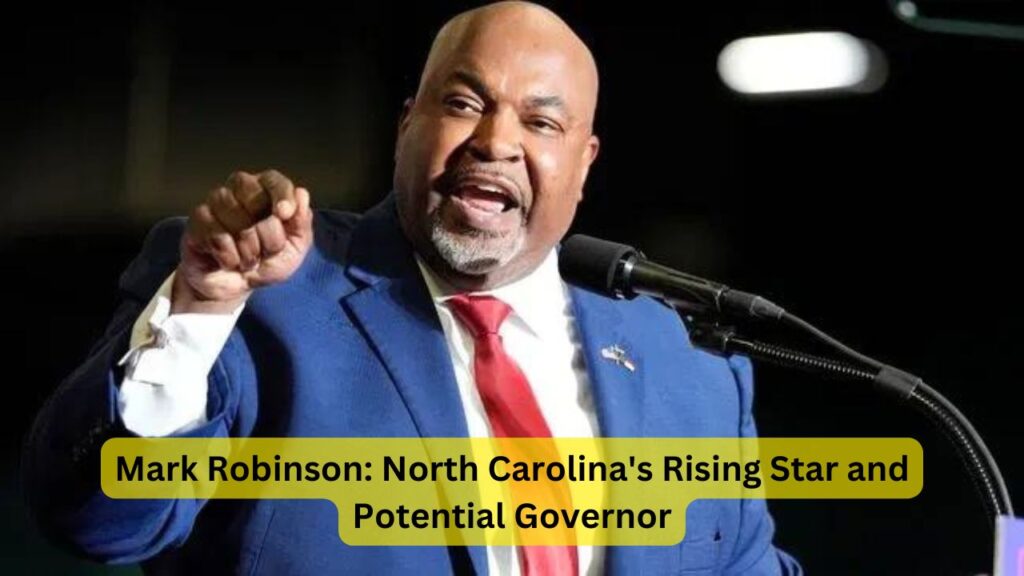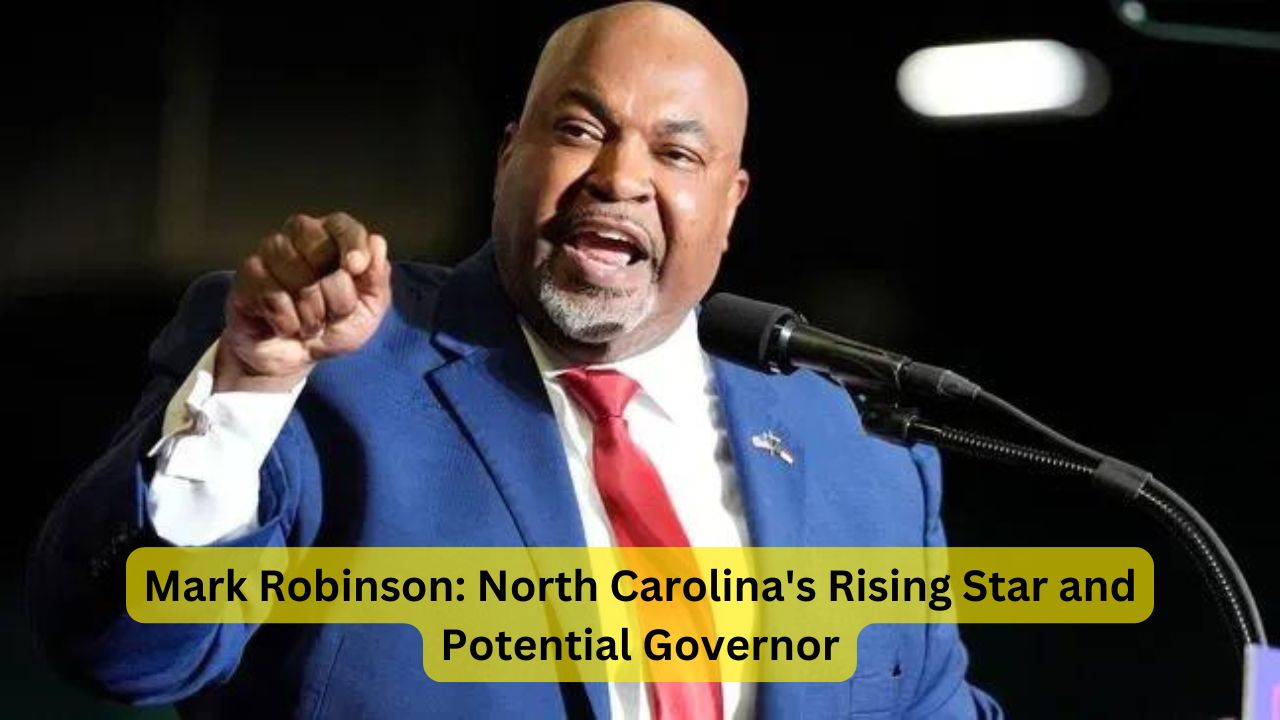
Mark Robinson has become a well-known figure in North Carolina politics, steadily gaining influence and recognition over the years. His rise from humble beginnings to becoming the state’s first Black lieutenant governor has been nothing short of remarkable. As he positions himself for a potential run for Governor of North Carolina, it’s worth understanding his background, political views, and the impact he has had on the state and beyond.
Who is Mark Robinson?
Mark Robinson first gained national attention in 2018 when a video of him passionately defending the Second Amendment at a Greensboro City Council meeting went viral. Born in Greensboro, North Carolina, in 1968, Robinson grew up in a working-class family as the ninth of ten children. His upbringing was tough, marked by financial struggles and the death of his father when Robinson was young. However, these challenges shaped his conservative beliefs, leading him to become a staunch advocate for individual liberties, religious freedom, and conservative family values.
Despite facing obstacles, Robinson persevered. Before entering politics, he worked in various jobs, including as a factory worker, and later co-owned a small business. His strong, unapologetic stance on conservative values resonated with many in the state, particularly in rural areas where those values are deeply ingrained.
Mark Robinson’s Path to Lieutenant Governor
Robinson’s entry into politics was unconventional, but it reflects the power of grassroots movements. In 2020, he decided to run for lieutenant governor of North Carolina, positioning himself as a candidate who would fight for the average North Carolinian. With little political experience but a strong message, Robinson managed to win the Republican primary, defeating several more seasoned politicians.
In the general election, Robinson faced Democrat Yvonne Lewis Holley. The race was closely watched, as North Carolina has traditionally been a politically divided state, with both Republicans and Democrats winning major offices in recent years. Robinson’s victory in the 2020 election was historic—not only because he became the first Black person to hold the position of lieutenant governor in the state, but also because he represented a clear shift in the political landscape. His win demonstrated the strength of the conservative movement in North Carolina, even in a state that has been closely contested in recent national elections.
Political Views and Legislative Agenda
Mark Robinson has never shied away from expressing his views. He is a staunch defender of the Second Amendment, religious freedom, and traditional family values. His speeches often center on the importance of faith, patriotism, and the rights of individuals to live free from government overreach.
As lieutenant governor, Robinson has used his platform to advocate for several key issues:
1. Second Amendment Rights
Robinson’s political career was essentially born from his passionate defense of gun rights, and he continues to be one of the loudest voices for the Second Amendment in North Carolina. He believes that the right to bear arms is a fundamental American freedom and has opposed any form of gun control legislation that he views as infringing on this right.
2. Education Reform
Robinson has been a strong advocate for education reform, particularly in the area of school choice. He supports the expansion of charter schools and voucher programs, arguing that parents should have more control over where and how their children are educated. He has also been critical of what he calls the “indoctrination” of students in public schools, advocating for the removal of certain curriculums that he believes promote left-wing ideologies.
3. Pro-Life Advocacy
Robinson is unapologetically pro-life. He believes in protecting the rights of the unborn and has supported legislation that would limit access to abortion. His views on this issue have endeared him to conservative voters, especially those who are motivated by faith-based values.
4. Economic Growth and Jobs
A key part of Robinson’s platform has been promoting economic growth and creating jobs, especially for rural and underserved communities in North Carolina. He supports policies that reduce regulation on businesses, arguing that a free-market approach will lead to job creation and a stronger economy. His focus has been on improving opportunities for small businesses and industries like agriculture, which play a vital role in North Carolina’s economy.
Potential Run for Governor of North Carolina
As of 2023, speculation is mounting that Mark Robinson will run for governor in the next election. His position as lieutenant governor has given him a significant platform, and his strong conservative base makes him a formidable contender in a state that has seen its political landscape shift over the past decade.
If Robinson runs for governor, his campaign will likely focus on the same issues that have defined his political career: gun rights, education reform, and conservative family values. His appeal to rural voters, combined with his ability to mobilize a grassroots base, could make him a strong candidate. However, he will also face significant challenges. North Carolina is a battleground state, and any Republican candidate will need to win over moderate voters in urban areas like Raleigh, Charlotte, and Durham.
Challenges and Controversies
Mark Robinson’s outspoken nature has also attracted controversy. He has been criticized for comments that some view as divisive, particularly regarding LGBTQ+ issues. Robinson has made several statements that have been labeled as anti-LGBTQ+, including referring to homosexuality as “filth” in a speech in 2021. These comments have drawn condemnation from various civil rights groups and political opponents.
However, Robinson has remained unapologetic, framing his views as rooted in his Christian faith. He argues that his beliefs about family and gender are traditional and reflect the views of many North Carolinians, particularly those in more conservative, rural parts of the state.
Despite these controversies, Robinson’s popularity among his base remains strong. His ability to tap into the frustrations and concerns of conservative voters has solidified his position as a major player in North Carolina politics.
Mark Robinson’s Influence Beyond North Carolina
Mark Robinson’s influence extends beyond North Carolina. As one of the few Black conservatives in high office, he has become a prominent figure within the national Republican Party. His speeches at national conservative conferences and his growing profile have made him a rising star within the party, and many believe that his political future could extend beyond the governorship of North Carolina.
Robinson represents a new wave of conservative leaders who are unafraid to challenge both the left and the establishment wings of their own party. His candid, often fiery rhetoric resonates with a base that feels increasingly alienated by mainstream political discourse.
Conclusion
As Mark Robinson continues to make headlines in North Carolina and beyond, his potential candidacy for governor could reshape the political landscape in the state. His strong stances on Second Amendment rights, education reform, and pro-life advocacy resonate with a large segment of voters, particularly in rural areas. However, his controversial comments and divisive rhetoric also pose significant challenges as he looks to broaden his appeal.
Robinson’s story, from factory worker to lieutenant governor, is one of perseverance and conviction. Whether or not he decides to run for governor, his influence on North Carolina politics is undeniable, and his rise reflects the shifting dynamics within the state and the broader Republican Party.
